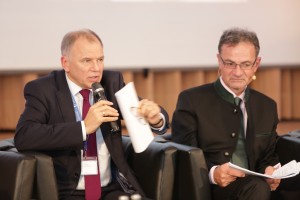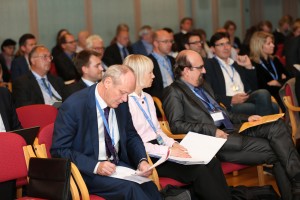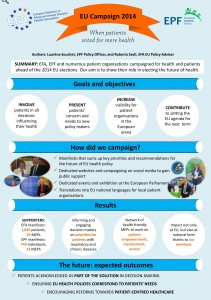With its three-day
programme, the
European Health Forum Gastein is the leading annual event for EU health policy serving as a platform for policy-makers and stakeholders to discuss about needs and latest developments in the field of health. As 2014 is a crucial year for European politics in general and for health policy in Europe in particular due to the European Parliament elections and the nomination of a new College of Commissioners, the topic for this year was “
Electing Health – The Europe We Want!”, where the EHFG reflected on the opportunities and risks for health, as well as on how to maintain and improve the health of European citizens.
[caption id="attachment_6187" align="alignright" width="300"]

Health and Food Safety Commissioner Vytenis Andriukaitis at Gastein.[/caption]
Keynote speeches in the Opening Plenary included former Greek Prime Minister George Papandreou and new Austrian Health Minister Sabine Oberhauser, who focused on the effects of the crisis on EU citizens’ health. The European Commission
Directorate-General for Health and Consumers (DG SANCO) organised a session on the future of EU health policy, while
Directorate-General Communications Networks, Content and Technology (DG CONNECT) organised a session on the need to deploy electronic health in Europe. Other topics included personalised medicines, patients’ empowerment (organised by the
European Patients’ Forum), and health literacy. In the Closing Plenary Commissioner-Designate for Health and Food Safety, Vytenis Andriukaitis, presented his views on how to structure the future of EU health policy in the next 5 years and emphasised the need to protect people, prevent diseases and promote health for all.
[caption id="attachment_6186" align="alignleft" width="270"]

Second from the left, Susanna Palkonen during the panel.[/caption]
On the 1
st of October, Susanna Palkonen, EFA Director, participated as a panel member as EPF Vice-President in the forum “Balancing care coordination and patient choice”, organised by the Austrian Federal Ministry of Health and the Main Association of Austrian Social Security Institutions in cooperation with the European Observatory on Health Systems and Policies. She emphasized that the main issues if empowering patients and right balance between care coordination and freedom of choice of provider needs to serve this balance. Patient empowerment belongs to all, not only those who can readily navigate complex healh care organisation. Transparency and lay friendly information are key.
On the 2
nd of October, EFA President Breda Flood made the case for patients’ involvement in all decisions influencing their health She was a spokesperson in the session organised by DG SANCO and focused on Scientific Advices where she defended the “Nothing about us without us” slogan: patients’ expertise and vision should be taken into account, as they have the unique expertise of living with the disease, an expertise unable to be found elsewhere and that allows to identify unmet needs and relative solutions. She underlined the urgent need for the European Union to bring the people into the policy making, society in general should be empowered to have the ownership of EU policies. As a best example of patients’ participation in Scientific Advise procedures, she mentioned EFA response to the European Commission’s
public consultation on fragrance allergens in the framework of the Cosmetics Products Regulation. After membership consultation, EFA underlined some positive aspects in the opinion, as well as some worrying gaps. In Europe allergy to fragrances in cosmetics affects about 1 to 3% of the general population and about 16% of eczema patients. People use these products to make them look good and feel clean, but the unintentional effect may be a decrease of quality of life, loss of productivity and worse health outcomes. Changes are therefore needed to ensure that the quality of life of these people is not further limited, public health concerns should always come first than any other economic considerations: while cosmetics are part of modern everyday life, they are not essential medicines or nutrients/food.

EFA EU Policy Advisor Roberta Savli was granted a scholarship by the International Forum Gastein, DGs SANCO and CONNECT and the
World Health Organisation Regional Office for Europe to join the
Young Forum Gastein, a network of more than 70 young professionals working in the field of public health in Europe. Together with EPF Policy Officer Laurène Souchet, she participated in the poster competition with the poster “
EU Campaign 2014 – When Patients Voted For Health”, where she presented the outcomes of
EFA and
EPF manifestos’ campaigns ahead of the 2014 European Parliament’s elections. Young Gasteiners had the opportunity to discuss with Commissioner-Designate Andriukaitis the future of EU health policies, the challenges and opportunities for Europe in times of economic recovery. The need to have a strategy on chronic diseases with disease specific best examples was underlined, together with the necessity to face more global defies, such as Ebola epidemic.
 Health and Food Safety Commissioner Vytenis Andriukaitis at Gastein.[/caption]
Keynote speeches in the Opening Plenary included former Greek Prime Minister George Papandreou and new Austrian Health Minister Sabine Oberhauser, who focused on the effects of the crisis on EU citizens’ health. The European Commission Directorate-General for Health and Consumers (DG SANCO) organised a session on the future of EU health policy, while Directorate-General Communications Networks, Content and Technology (DG CONNECT) organised a session on the need to deploy electronic health in Europe. Other topics included personalised medicines, patients’ empowerment (organised by the European Patients’ Forum), and health literacy. In the Closing Plenary Commissioner-Designate for Health and Food Safety, Vytenis Andriukaitis, presented his views on how to structure the future of EU health policy in the next 5 years and emphasised the need to protect people, prevent diseases and promote health for all.
[caption id="attachment_6186" align="alignleft" width="270"]
Health and Food Safety Commissioner Vytenis Andriukaitis at Gastein.[/caption]
Keynote speeches in the Opening Plenary included former Greek Prime Minister George Papandreou and new Austrian Health Minister Sabine Oberhauser, who focused on the effects of the crisis on EU citizens’ health. The European Commission Directorate-General for Health and Consumers (DG SANCO) organised a session on the future of EU health policy, while Directorate-General Communications Networks, Content and Technology (DG CONNECT) organised a session on the need to deploy electronic health in Europe. Other topics included personalised medicines, patients’ empowerment (organised by the European Patients’ Forum), and health literacy. In the Closing Plenary Commissioner-Designate for Health and Food Safety, Vytenis Andriukaitis, presented his views on how to structure the future of EU health policy in the next 5 years and emphasised the need to protect people, prevent diseases and promote health for all.
[caption id="attachment_6186" align="alignleft" width="270"] Second from the left, Susanna Palkonen during the panel.[/caption]
On the 1st of October, Susanna Palkonen, EFA Director, participated as a panel member as EPF Vice-President in the forum “Balancing care coordination and patient choice”, organised by the Austrian Federal Ministry of Health and the Main Association of Austrian Social Security Institutions in cooperation with the European Observatory on Health Systems and Policies. She emphasized that the main issues if empowering patients and right balance between care coordination and freedom of choice of provider needs to serve this balance. Patient empowerment belongs to all, not only those who can readily navigate complex healh care organisation. Transparency and lay friendly information are key.
On the 2nd of October, EFA President Breda Flood made the case for patients’ involvement in all decisions influencing their health She was a spokesperson in the session organised by DG SANCO and focused on Scientific Advices where she defended the “Nothing about us without us” slogan: patients’ expertise and vision should be taken into account, as they have the unique expertise of living with the disease, an expertise unable to be found elsewhere and that allows to identify unmet needs and relative solutions. She underlined the urgent need for the European Union to bring the people into the policy making, society in general should be empowered to have the ownership of EU policies. As a best example of patients’ participation in Scientific Advise procedures, she mentioned EFA response to the European Commission’s public consultation on fragrance allergens in the framework of the Cosmetics Products Regulation. After membership consultation, EFA underlined some positive aspects in the opinion, as well as some worrying gaps. In Europe allergy to fragrances in cosmetics affects about 1 to 3% of the general population and about 16% of eczema patients. People use these products to make them look good and feel clean, but the unintentional effect may be a decrease of quality of life, loss of productivity and worse health outcomes. Changes are therefore needed to ensure that the quality of life of these people is not further limited, public health concerns should always come first than any other economic considerations: while cosmetics are part of modern everyday life, they are not essential medicines or nutrients/food.
Second from the left, Susanna Palkonen during the panel.[/caption]
On the 1st of October, Susanna Palkonen, EFA Director, participated as a panel member as EPF Vice-President in the forum “Balancing care coordination and patient choice”, organised by the Austrian Federal Ministry of Health and the Main Association of Austrian Social Security Institutions in cooperation with the European Observatory on Health Systems and Policies. She emphasized that the main issues if empowering patients and right balance between care coordination and freedom of choice of provider needs to serve this balance. Patient empowerment belongs to all, not only those who can readily navigate complex healh care organisation. Transparency and lay friendly information are key.
On the 2nd of October, EFA President Breda Flood made the case for patients’ involvement in all decisions influencing their health She was a spokesperson in the session organised by DG SANCO and focused on Scientific Advices where she defended the “Nothing about us without us” slogan: patients’ expertise and vision should be taken into account, as they have the unique expertise of living with the disease, an expertise unable to be found elsewhere and that allows to identify unmet needs and relative solutions. She underlined the urgent need for the European Union to bring the people into the policy making, society in general should be empowered to have the ownership of EU policies. As a best example of patients’ participation in Scientific Advise procedures, she mentioned EFA response to the European Commission’s public consultation on fragrance allergens in the framework of the Cosmetics Products Regulation. After membership consultation, EFA underlined some positive aspects in the opinion, as well as some worrying gaps. In Europe allergy to fragrances in cosmetics affects about 1 to 3% of the general population and about 16% of eczema patients. People use these products to make them look good and feel clean, but the unintentional effect may be a decrease of quality of life, loss of productivity and worse health outcomes. Changes are therefore needed to ensure that the quality of life of these people is not further limited, public health concerns should always come first than any other economic considerations: while cosmetics are part of modern everyday life, they are not essential medicines or nutrients/food.
 EFA EU Policy Advisor Roberta Savli was granted a scholarship by the International Forum Gastein, DGs SANCO and CONNECT and the World Health Organisation Regional Office for Europe to join the Young Forum Gastein, a network of more than 70 young professionals working in the field of public health in Europe. Together with EPF Policy Officer Laurène Souchet, she participated in the poster competition with the poster “EU Campaign 2014 – When Patients Voted For Health”, where she presented the outcomes of EFA and EPF manifestos’ campaigns ahead of the 2014 European Parliament’s elections. Young Gasteiners had the opportunity to discuss with Commissioner-Designate Andriukaitis the future of EU health policies, the challenges and opportunities for Europe in times of economic recovery. The need to have a strategy on chronic diseases with disease specific best examples was underlined, together with the necessity to face more global defies, such as Ebola epidemic.
EFA EU Policy Advisor Roberta Savli was granted a scholarship by the International Forum Gastein, DGs SANCO and CONNECT and the World Health Organisation Regional Office for Europe to join the Young Forum Gastein, a network of more than 70 young professionals working in the field of public health in Europe. Together with EPF Policy Officer Laurène Souchet, she participated in the poster competition with the poster “EU Campaign 2014 – When Patients Voted For Health”, where she presented the outcomes of EFA and EPF manifestos’ campaigns ahead of the 2014 European Parliament’s elections. Young Gasteiners had the opportunity to discuss with Commissioner-Designate Andriukaitis the future of EU health policies, the challenges and opportunities for Europe in times of economic recovery. The need to have a strategy on chronic diseases with disease specific best examples was underlined, together with the necessity to face more global defies, such as Ebola epidemic.